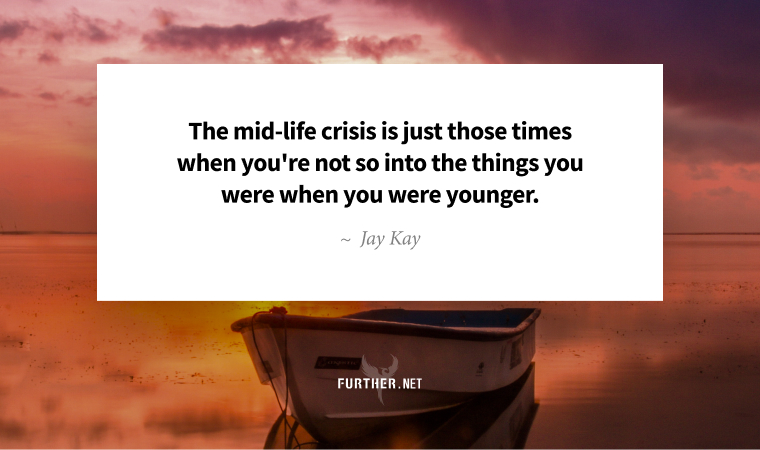
Hey there, welcome to this week’s Further.
I do quite a few podcast interviews, usually about entrepreneurship and digital marketing. But recently I got to do one for the kind of things we talk about here at Further. It was a nice change of pace.
So this week I’m sharing that interview with Stephanie Sammons, a certified financial planner and the host of the Retirement Money Gal Podcast. We discuss wealth, work, and wellness as the critical pillars for creating your best life at midlife … now and into the future.
And as you might guess, the topics of midlife dissatisfaction, our likely role as Generation X-tended via longevity science, and the idea of unretirement came up throughout. Listen (or read the transcript) for our discussion that touches on:
- Midlife reflection on our past successes (and failures)
- The Happiness U-Curve and paradox of aging
- Why healthspan matters more than ever
- Exploring work options that can create more balance in your life
- Longevity science and the implications of living longer
- Entrepreneur at midlife (it’s not as scary as you may think)
- Embracing a work optional retirement, or postponing it altogether
Living Your Best Midlife and Postponing Retirement with Brian Clark
Fasting Facts
Some people think intermittent fasting is just a fancy way of saying you skip breakfast, but that’s not correct. In fact, there’s a knack to it that means you can get it wrong. This article compiles some of the biggest mistakes you could be making with your fasting plan.
The 6 Most Common Mistakes People Make While Intermittent Fasting
Taking Stock
“The 2020 turmoil has served as a wake-up call that a complacent investor is a vulnerable one. After all, uncertainties still abound, for stocks in particular. After a nearly straight-up trajectory since spring, more of a pause may be in store.”
8 Costly Investing Mistakes That Could Ruin You
Virtual Bondage
At a time when we all could benefit from a digital detox to embrace unmediated experiences, we’ve instead been driven online more than ever seeking information and connection. 2020 will be looked back on as the tipping point for mass virtualization, but we don’t yet know what that will mean.
The Virus Changed the Way We Internet
I, Cyborg
Brain-computer interfaces were initially focused on helping paralyzed people control assistive devices using their thoughts. But they can now be used as a neurofeedback training tool to improve cognitive performance. Expect to see a growing number of professionals leveraging BCI tools to improve their performance at work in the near future.
What Brain-Computer Interfaces Could Mean for the Future of Work
Scroll down for the power of small decisions. And today’s Flashback is an 80s song that is unfortunately all too relevant this week.
Keep going-
P.S. RIP Eddie Van Halen. Man, 2020 is relentless.
Finding Certainty in Simple Decisions

By Trudi Roth
Last March, decision-making became much harder. What used to be no-brainers — like going grocery shopping or visiting the grandparents — can be, at best, a logistical time-suck. And at worst, it may have life-threatening consequences.
This stressful reality does a number on focus and productivity. Heap on the whiplash-inducing news cycle, and even the sharpest among us are dulled by brain fog.
Ironically, what complicates decision-making — uncertainty — can be a force of good. No, really.
That’s because it helps you think more critically about your choices and what you can control. So if you’re over feeling overwhelmed, now’s the perfect time to dig into your daily processes to reclaim your focus.
Decisions, decisions
When you think about it, almost everything is a decision.
As business coach Rob Hatch points out in Attention! The Power of Simple Decisions in a Distracted World, your brain doesn’t handle multiple tasks simultaneously. It continually jumps from one to another. This builds diminishing returns into your day.
Research indicates that for every decision we make, our ability to make subsequent decisions is negatively impacted.
Of course, all choices aren’t equal — some are simpler to make than others. Under normal circumstances, we humans naturally develop habits that take decision-making out of routine activities.
Nowadays, though, all bets are off. In an age of disinformation, disruption, and high anxiety, analysis paralysis abounds. Stress has been shown to make your brain process things more rigidly, turning to our cognitive biases rather than creative problem solving to find a way forward.
If you think there’s got to be a better way, then you recognize that regaining your mental acuity is a choice. And that’s the first step.
The shrewd abides
While there are many ways to get your focus back, including mindfulness practices, Hatch advocates systems to help build new habits and break the cycle of decision fatigue.
Topping the list is a concept Hatch calls “putting success in your way.” It’s based on the premise that willpower is limited, decisions are distractions, and habits are biologically empowered. All it takes is a little forethought and prep.
So, for example, if you want to get back to jogging a few days a week, put your sneakers, exercise clothes, and charged phone and ear buds your bedside the night before. Before you know it, rolling out of bed and hitting the road becomes a habit.
Ditto for work. Just pick three things you need to accomplish the night before and make the first two hours at your desk an interruption-free zone. Then if the day goes sideways, your productivity is still intact.
Sounds simple, right? And that’s because it is. Decisions aren’t hard when you diffuse their ability to distract you.
Why Is Decision-Making So Hard During a Pandemic? (Psychology Today)
Attention! The Power of Simple Decisions in a Distracted World (Amazon Associates)
further: flashback

Living Colour – Cult Of Personality
Vivid, 1988
“I exploit you, still you love me … I tell you one and one makes three. I’m the cult of personality.” (YouTube)
further: sharing
Enjoying Further? Share this issue and you can earn cool Further gear when people subscribe.

Handy sharing links: Twitter | Facebook | LinkedIn | WhatsApp | Email
You can also share wherever you like by copying and pasting your unique referral link for this issue:
{{subscriber.rh_reflink}}
Thank you for sharing Further!
